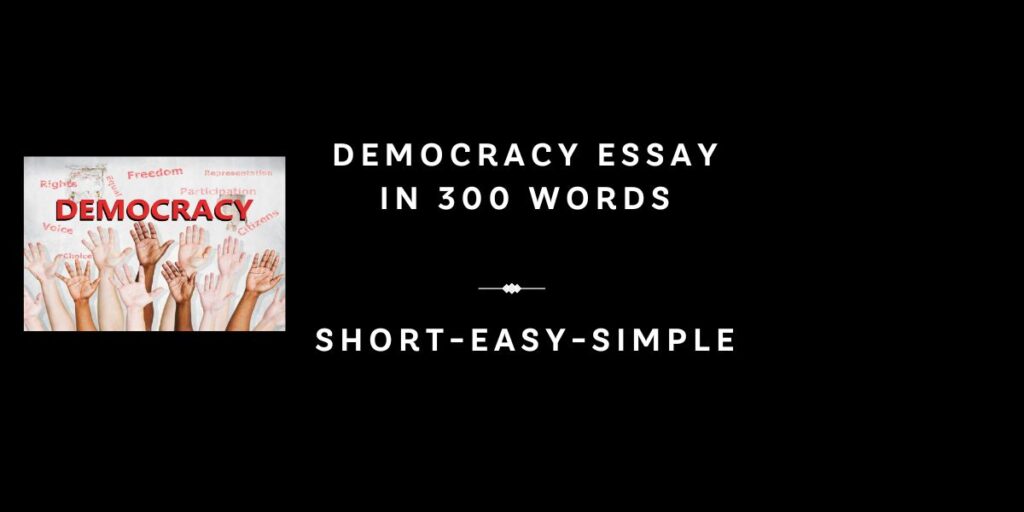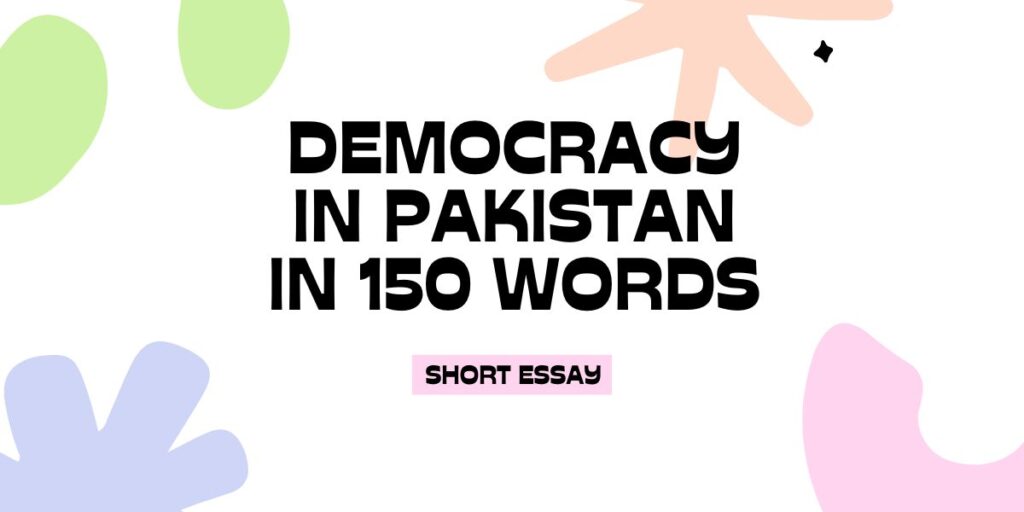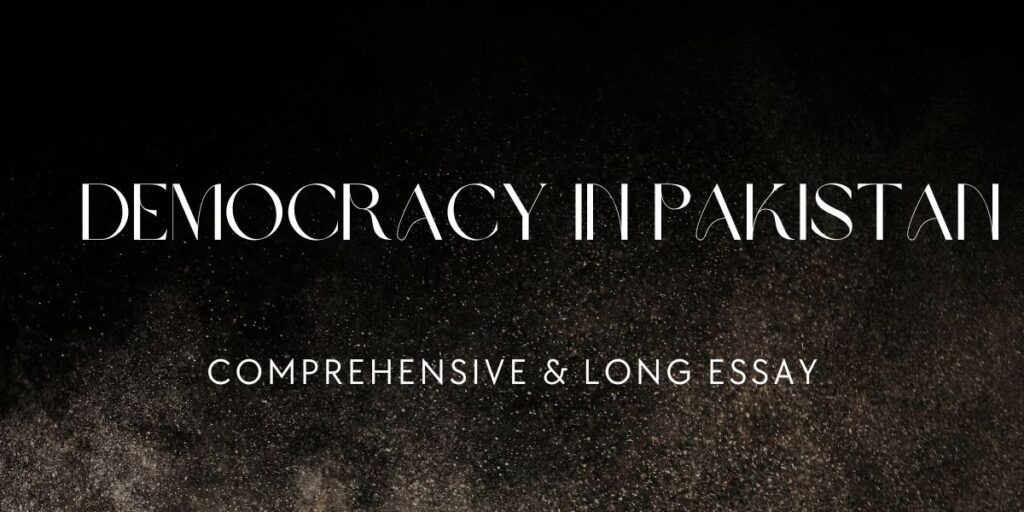Democracy Essay In 300 Words
Democracy essay in 300 words is about understanding the essence of democracy, a system where the people have the power. In a democracy, citizens play an important role in decision-making through voting. This form of government values equality, freedom and the voice of the people.
Democracy Essay In 300 Words
Democracy, a system where power rests with the people, is the cornerstone of modern societies. In simple terms, democracy means that citizens have a say in how their country is run. It’s like a big group project where everyone gets a vote on what to decide.
One of the best things about democracy is voting. Imagine it’s your birthday, and you want everyone to have a taste of the cake. This is how voting works in a democracy. During elections, every citizen gets to choose who they want to represent in making important decisions for the country. Whether you are a doctor, a teacher or a plumber, your vote counts.
Democracy is not just about voting. It is also about freedom. In a democratic country, you can say what you want without any problem. It’s like you can choose your own clothes or hairstyle without someone telling you. This freedom of speech is very important because it allows people to express their views, voice their opinions and criticize the government if they think something is wrong.
You May Like To Read An Essay: Education System Of Pakistan
Another great thing about democracy is the rule of law. This means that everyone, including the President or the Prime Minister, has to follow the same rules. It’s like playing a game where everyone has to play fair. It ensures that no one is treated unfairly and that justice is served equally to all.
But democracy is not perfect. Sometimes people don’t vote because they don’t think their vote counts, or they don’t like any of the options. This is called voter apathy, and it can undermine democracy. Also, democracy can be slow and messy because everyone has different opinions, and it takes time to reach a decision that everyone can agree on.
In the end, democracy is like a big birthday party where everyone has their say. It’s about voting, freedom, and following the rules. Although it has its flaws, democracy is still the best way we know to ensure that everyone’s voice is heard and everyone has a fair chance. So let’s celebrate democracy and keep working to make it better!
Democracy in Pakistan Essay 300 words: Easy
Democracy is a big word, but it’s all about how things are done. Imagine you are in a group project at school. In a democracy, everyone gets a chance to share their ideas and vote on the best plan.
Voting is like picking your favorite pizza topping. During elections people choose who they want to lead their country. This is important because it lets everyone have a say, whether you’re a child, a teacher or a firefighter.
In a democracy, you can say what you think without getting in trouble. It’s like talking with your friends about what games to play. This freedom is important because it allows people to share their ideas without fear.
In a democracy everyone, even the leaders, have to follow the rules. It’s like playing a game where everyone follows the same rules. This ensures that everyone is treated equally.
But sometimes, people don’t want to vote because they think it doesn’t matter. Or it may take a long time to agree on things because everyone has different ideas.
Overall, democracy means that everyone has a say and is treated fairly. It is a way for people to work together to improve their country. Therefore, it is important to listen to each other and make choices that help everyone.
Democracy In Pakistan Essay 250 Words
Democracy is more than just a word. It is a system where the voices of everyday people shape a nation. At its core, democracy means that everyone has a say in how things are run, such as being part of a large team where everyone’s opinion counts.
Voting is the center of democracy. It’s like choosing your favorite flavor of ice cream, but instead of ice cream, it’s choosing leaders. During elections, each citizen casts their vote for the candidate who they believe will best represent their interests. Whether you are a farmer, a student or a shopkeeper, your vote has the same weight.
But democracy is not just about voting. It is also about freedom. Picture a world where you can speak your mind without fear of punishment – that’s the freedom democracy offers. It equates to the freedom to choose your own path in life without anyone dictating your every move. This freedom of expression is important because it encourages open dialogue and allows for the exchange of diverse ideas.
Another important aspect of democracy is the rule of law. This means that everyone, regardless of their location, is subject to the same laws. It is like playing a game where everyone follows the same rules to ensure fairness. It ensures that no one is above the law and justice is provided equally to all.
Despite its power, democracy is not flawless. Sometimes, people feel that their vote doesn’t matter, leading to voter apathy. Furthermore, different opinions and interests can make reaching consensus slow and difficult in a democratic system.
Finally, democracy empowers individuals and ensures that their voices are heard. It’s about voting, liberty, and equality under the law. While it may have its flaws, democracy remains a beacon of hope for societies around the world, promising government of the people, by the people, and for the people. Let us cherish and uphold the principles of democracy to build a better future for all.
Essay On Democracy In Pakistan In 150 Words
Democracy is when everyone gets to help make decisions. It’s like a big vote where everyone’s choice counts. You can choose who you want to lead your country by voting for them.
In a democracy, you can say what you think without getting in trouble. It’s like talking to your friends about what you like and don’t like. This freedom is important because it allows people to share their ideas.
In a democracy everyone has to follow the rules even the leaders. It’s like playing a game where everyone has to play fair. It ensures that everyone is treated equally.
But sometimes, people don’t want to vote because they think it doesn’t matter. Or it may take a long time to agree on things because everyone has different ideas.
Overall, democracy means that everyone has a say and is treated fairly. It is a way for people to work together to improve their country. Therefore, it is important to listen to each other and make choices that help everyone.
Essay On Democracy In Pakistan For Class 9
Democracy is a big word, but it’s all about how things are done. Imagine you are in a group project at school. In a democracy, everyone gets a chance to share their ideas and vote on the best plan.
Voting is like picking your favorite pizza topping. During elections people choose who they want to lead their country. This is important because it lets everyone have a say, whether you’re a child, a teacher or a firefighter.
In a democracy, you can say what you think without getting in trouble. It’s like talking with your friends about what games to play. This freedom is important because it allows people to share their ideas without fear.
In a democracy everyone, even the leaders, have to follow the rules. It’s like playing a game where everyone follows the same rules. This ensures that everyone is treated equally.
But sometimes, people don’t want to vote because they think it doesn’t matter. Or it may take a long time to agree on things because everyone has different ideas.
Overall, democracy means that everyone has a say and is treated fairly. It is a way for people to work together to improve their country. Therefore, it is important to listen to each other and make choices that help everyone. Democracy empowers the people, ensuring that everyone’s voice is heard.
Essay On Democracy In Pakistan With Outline
Democracy in Pakistan: A Path to People’s Power
Democracy in Pakistan is not just a word but a way of life. This means that everyone from the busy shopkeeper to the school teacher has a voice in how the country is run. Let’s examine what democracy looks like in Pakistan and some of the challenges it faces along the way.
Introduction to Democracy in Pakistan
After gaining independence in 1947, Pakistan began its journey towards democratic governance. Over the years, democratic institutions such as parliament and the judiciary have developed, albeit with occasional setbacks.
Challenges Faced by Democracy in Pakistan
The biggest obstacle is political instability. With frequent changes in government, it is often difficult to maintain continuity in policies and plans. Military interference in politics has also been a recurring problem, disrupting the democratic process and governance. Additionally, corruption remains a major concern, with some officials abusing their powers for personal gain rather than serving the public interest.
Democratic Institutions in Pakistan
Parliament is the cornerstone of Pakistan’s democracy. Consisting of elected representatives from across the country, it is responsible for legislating and representing the interests of the people. The judiciary, meanwhile, acts as the guardian of the rule of law, ensuring that everyone – regardless of their status – is treated fairly under the law. The Election Commission plays an important role in conducting free and fair elections, protecting the integrity of the electoral process.
Political Parties in Pakistan
Pakistan boasts a dynamic political landscape, with numerous political parties representing diverse ideologies and interests. These parties play an important role in shaping national policies and agendas, often engaging in vigorous debates and negotiations in the political arena.
Electoral Process in Pakistan
Voting is a fundamental aspect of democracy in Pakistan. Citizens must register to vote, and on Election Day, they will have the opportunity to vote for their favorite candidates. The media plays an important role in disseminating information about candidates and the electoral process, ensuring that voters are well informed.
Civil Society and Democracy
Civil society organizations, including non-profits and advocacy groups, play an important role in promoting democracy and protecting human rights. They act as watchdogs, hold government accountable and advocate for social justice and equality.
Women’s Participation in Democracy
Despite progress, women in Pakistan continue to face barriers to political participation. Recognizing the importance of gender equality in a democracy, efforts are underway to increase women’s representation in politics and decision-making processes.
Rights of Minorities in Democracy
Protection of minority rights is essential in a democratic society. Efforts are being made to ensure that minority communities are treated fairly and have equal opportunities to participate in the democratic process.
Freedom of speech and media in Pakistan
A free and independent media is vital to democracy. However, journalists in Pakistan often face challenges, including censorship and threats to their safety, which highlight the importance of protecting press freedom.
Education and Democracy
Education plays an important role in promoting democratic values and civic engagement among citizens. By providing civic education in schools and colleges, Pakistan can empower its citizens to actively participate in the democratic process.
Economic development and democracy
Economic prosperity is closely related to democratic stability. However, economic inequality remains a challenge, highlighting the need for inclusive economic policies to ensure that all citizens benefit from democracy.
Regional and Global Implications of Democracy in Pakistan
The stability of Pakistan’s democracy has far-reaching implications, not only for its citizens but also for regional and global stability. As such, international cooperation and support are crucial in promoting and sustaining democracy in Pakistan.
Role of Youth in Strengthening Democracy
Youth has an important role in shaping the future of democracy in Pakistan. By getting involved in politics, advocating for change, and participating in civic activism, young people can contribute to building a more vibrant and inclusive democracy.
Strengthening democratic institutions
Reforms are needed for the stability of democratic governance in Pakistan. This includes enhancing transparency, accountability and inclusion within institutions to ensure that they effectively serve the interests of the people.
Democratic Culture and Values in Pakistan
To build a strong democracy, it is important to promote democratic values such as tolerance, pluralism and respect for diversity. By adopting these values, Pakistan can create a culture of mutual respect and cooperation among its citizens.
Conclusion
Democracy in Pakistan is a journey marked by both progress and challenges. By addressing critical issues such as political instability, corruption and social inequality, Pakistan can build a stronger and more inclusive democracy that truly reflects the aspirations of its people.
Frequently Asked Questions (FAQs)
- What are the major challenges to democracy in Pakistan?
– Answer: Political instability, military intervention and corruption are among the main challenges facing democracy in Pakistan.
- How does the military influence politics in Pakistan?
– Answer: The military has historically held significant influence in Pakistani politics, often through direct intervention or behind-the-scenes maneuvers.
- What steps can be taken to increase women’s participation in democracy?
– Answer: Initiatives such as affirmative action, women’s quotas and awareness campaigns can help increase women’s representation in politics and decision-making processes.
- How does media freedom impact democratic processes in Pakistan?
– Answer: Media freedom is essential for holding the government accountable, informing citizens, and facilitating open dialogue and debate in a democratic society.
- What role do international organizations play in promoting democracy in Pakistan?
– Answer: International organizations provide support, resources and technical assistance to strengthen democratic institutions, promote human rights and promote good governance in Pakistan.
- What is democracy in simple words?
Answer: Democracy means that every person in a country has the right to make decisions. It’s like a big team where everyone’s opinion matters. People can vote for their leaders and speak freely. Everyone, including leaders, should follow the same rules. Democracy is the name of giving power to the people and doing justice to all.
- What is democracy brief summary?
Answer: Democracy is when everyone has a say in how things are run. It’s like a big group project where everyone’s ideas count. People can vote for their leaders and express their opinions freely. In a democracy everyone is treated equally and leaders have to listen to what the people want. It’s all about empowering people and making sure everyone gets a fair chance.
- What is the importance of democracy in paragraph?
Answer: Democracy is very important because it ensures that everyone has a voice in how their society is run. It empowers citizens to participate in the decision-making process, allowing them to choose their leaders through fair and free elections. This involvement fosters a sense of ownership and accountability in both the government and the public. Furthermore, democracy promotes fundamental rights and freedoms, such as freedom of speech and expression, which are essential to a thriving and just society. Furthermore, democracy acts as a check against abuse of power, as elected representatives are accountable to the electorate and can be removed from office if they fail to fulfill their responsibilities. Overall, democracy is indispensable for transparency, equality, and protection of individual liberties, which ultimately contribute to the stability and development of nations.
- What is important for democracy?
Answer: Several key factors are important for democracy to thrive:
- Citizen Participation: Democracy requires active participation from citizens who vote in elections, engage in political discussions, and contribute to civic life.
- Free and Fair Elections: Elections must be conducted without interference, ensuring that all eligible citizens have the opportunity to cast their vote and that the results accurately reflect the will of the people.
- Rule of Law: Democracy requires that everyone, including leaders and citizens, abide by the same laws. This ensures accountability, fairness, and justice within society.
- Protection of Civil Liberties: Democratic societies uphold individual rights and freedoms, such as freedom of speech, assembly, and religion, allowing citizens to express themselves freely without fear of persecution.
- Independent Judiciary: An independent judiciary ensures that the legal system operates impartially, upholding the rule of law and safeguarding against abuses of power.
- Freedom of the Press:A free and independent media plays a critical role in holding government officials accountable, informing the public, and fostering transparency within society.
- Respect for Minority Rights:In a democracy, the rights of minority groups are protected, and their voices are heard alongside those of the majority, promoting inclusivity and diversity.
- Political Stability: A stable political environment is essential for democracy to function effectively, allowing for peaceful transitions of power and continuity in governance.
Overall, these factors work together to create a democratic system that is responsive to the needs and desires of the people, fostering trust, participation, and accountability within society.






Pingback: A Visit To A Historical Place Essay 100 Words In Pakistan » BEST ENGLISH NOTES